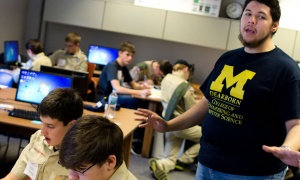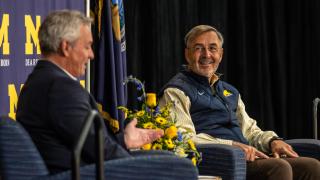

During a recent tax season, 44 University of Michigan-Dearborn volunteers—42 students and two faculty—served 1,300 individuals and families and brought $1.49 million in tax returns back to the community.
Students, faculty and staff gave both time and money to bring more than 300 middle school students—many of whom said they had never been to a college campus and didn’t have college-going role model—to campus to give them an educational experience.
Annually, students and faculty teach STEM (Science, Technology, Engineering and Math) skills to Girl and Boy Scout troops, helping them earn their technology badges.
For these outreach projects and more, UM-Dearborn recently earned a spot on the President’s Higher Education Community Service Honor Roll, which recognizes higher education institutions that reflect the values of exemplary community service and achieve meaningful outcomes in their communities. The honor was based on volunteer work from the 2013-2014 academic year.
Office of Metropolitan Impact Assistant Director Molly Manley said UM-Dearborn students, faculty and staff are committed to impacting the metro Detroit community in a positive way. And she says that commitment starts at the top.
“As a result of Chancellor Daniel Little’s sincere commitment, community engagement and service have become a part of the fabric and culture of the university and is evidenced at every level of the institution,” Manley said. “Earning this honor advances our agenda as a major player in the transformation of southeast Michigan.”
Director of Student Success Amy Finley, who worked with Manley and Civic Engagement Coordinator Melissa Booth on applying for the honor, said the university has always had a culture of community service. But a more focused campus approach in community service project reporting and impact evaluation has gotten the campus’ efforts national recognition.
“We have improved not only our ability to share stories, but to also demonstrate our economic and social impact on southeast Michigan,” Finley said. “That process has improved greatly, and we will continue to seek opportunities to build capacity for service, data collection and outcome sharing.”
Adding the President’s Higher Education Community Service Honor Roll to the list, the university has received numerous recent awards for its service efforts, including the 2015 Carnegie Engaged Campus Classification, 2015 Michigan Campus Compact Engaged Campus of the Year and the 2015 Michigan Campus Compact Presidential Leadership Award for Chancellor Little.
“These awards increase the interest and spirit with which we pursue the goal of metropolitan impact and demonstrates the continuous progress of our campus toward its Metropolitan Vision,” Finley said.




